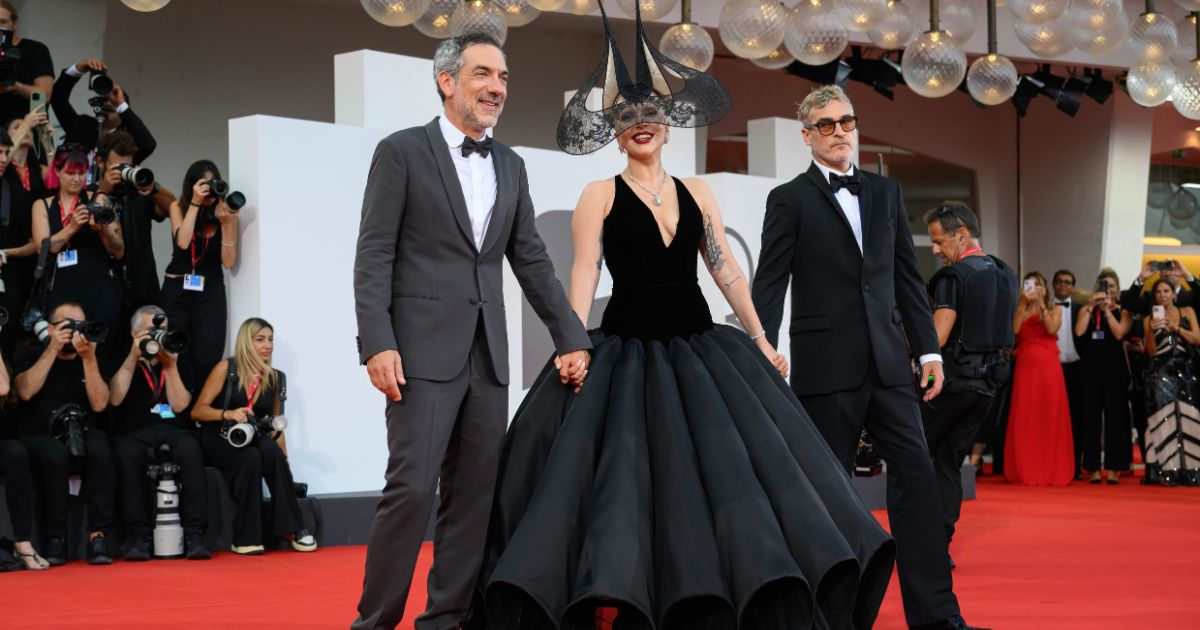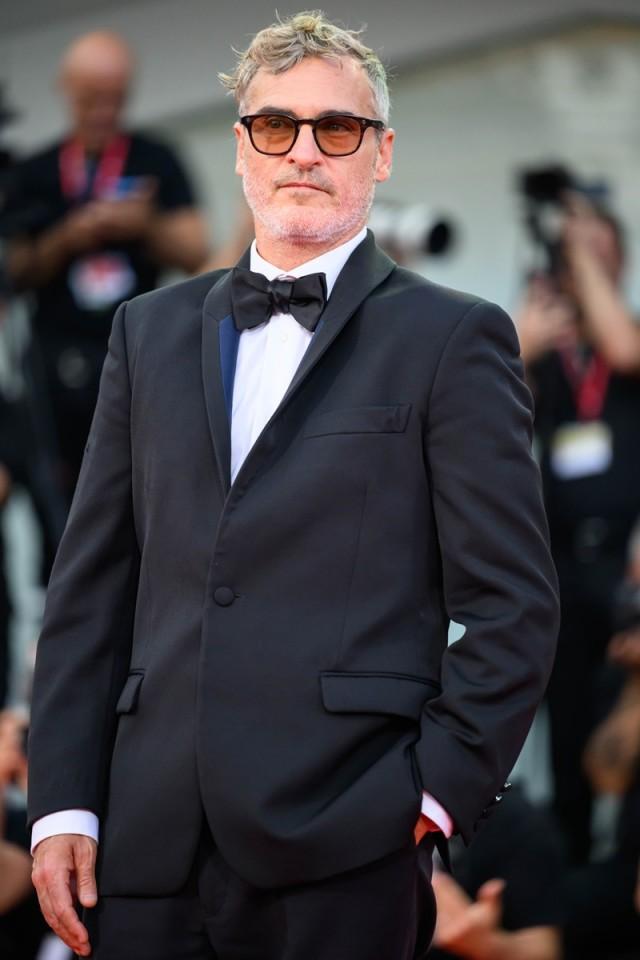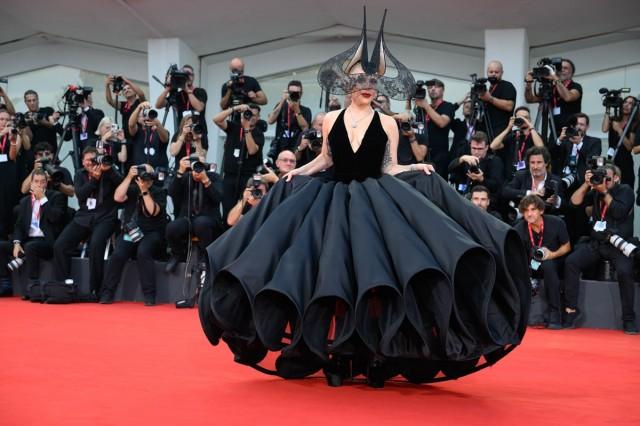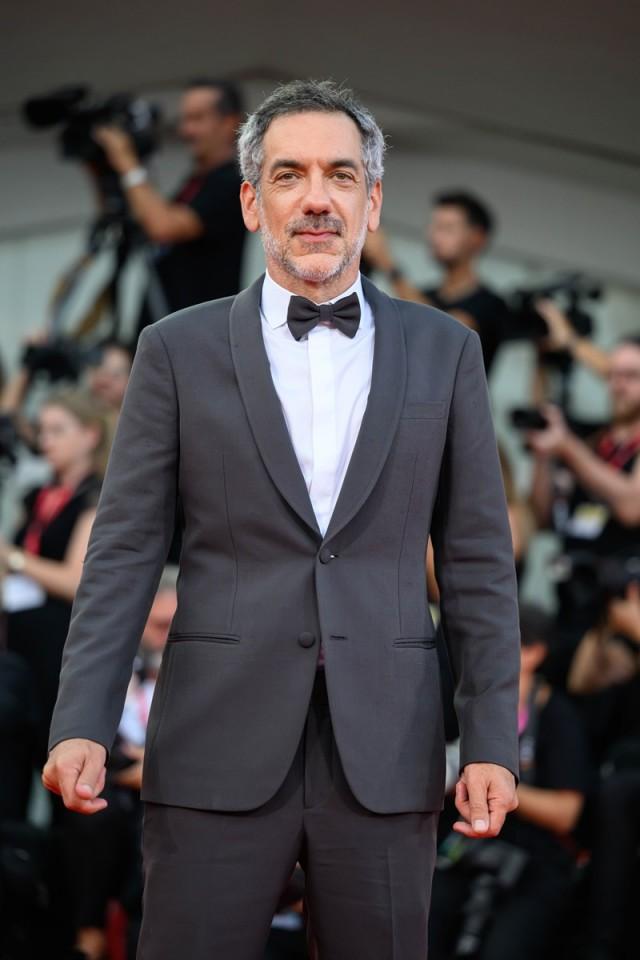Joaquin Phoenix, Lady Gaga, Todd Phillips on 'Joker: Folie à Deux'

Joaquin Phoenix and Lady Gaga make the perfect badass couple in their latest movie, "Joker: Folie à Deux."
Phoenix, who reprises his role as the mentally ill nihilistic criminal Arthur Fleck/Joker, displays his singing skills in this musical psychological thriller by Todd Phillips. "We sang live. That felt exciting," Phoenix revealed.
Lady Gaga, who was perfect for the role of Harley Quinn, shows that she has what it takes to be taken seriously as an actress. I still remember our interview with the musical icon who got emotional when we interviewed her for her first feature film as an actress in Bradley Cooper's "A Star is Born" (2018). "I have always wanted to be an actress," she confessed.
She was, of course, the queen of the red carpet at the 81st Venice Film Festival where she wore a sleeveless black Christian Dior Haute Couture ballgown and a Philip Treacy headpiece that was truly a head-turner. For the first time, she also arrived with her fiancé Michael Polansky. It was the couple's first public appearance together.
Also arriving with his partner was Phoenix who came with actress Rooney Mara.
At the press conference at the Palazzo del Casino in Lido, Phoenix, Gaga and Phillips talked about the making of their musical psychological thriller, the challenges, their choice of music, working together, and the idea of making it a musical.
Joaquin Phoenix (Arthur Fleck/Joker)

Can you talk about the unexpected pleasure and opportunity to sing duets with Lady Gaga?
Part of the joy was taking these songs that were standards and trying to find a way that it felt like they were specific to the characters, that it was the only way that the characters could express themselves was through these particular songs, sung in this way. That was part of what was an interesting point for us because initially, we started with some references where I had Frank Sinatra and Sammy Davis Jr. and these legends.
We started trying to emulate that sound, or at least I did, before we realized wait a second, this is not who Arthur is. This might be who Joker wants to be. That was a point, at least for me, where it felt like something clicked where we took these standards and decided to do our own understanding of them or interpretation and Gaga or Stephanie early on, was like, "Oh we're going to sing live." I was like, "No we're not. You can sing live if you'd like."
Ultimately, we did it and it was the only way. Not only did we sing live, but every part of the recording was live. We didn't sing to completed tracks or a clip track. We were working with a pianist on set. Each take was a different version of the song and of singing the song. That felt exciting. I think we created an energy that was necessary at least that I felt was necessary.
Can you tell us about the dream that you had that inspired this movie?
The dream is not to inspire the movie. I had this dream that I was performing as Joker doing songs and I called Todd because I thought there might be something there and there wasn't.
You said that the first movie mirrored somehow the world at that time. It felt this morning that the world is darker, it's chaotic, it's going to hell. Joaquin, if you could tell us what was the central emotion or the central concept that drives Arthur in this movie?
I never think about things this way. I like it when you write about it and then you just share your opinion. But I think on this definitely, simply love. I think the quest for love and that kind of safety that I think he yearns for and has yearned for is a big propellant on this one. Is that fair to say?
You have a real physical preparation for the role, which, if anything, looks incredibly striking. I wanted to ask you how you went about that, and if at some stage you'll think, I can't physically do this anymore, it's too dangerous.
It's not that dangerous. We work with the doctor, but I mean, thank you for the question, but I'm not going to talk through the specifics of the diet, because I just think nobody wants to hear that. But this time it felt a bit more complicated just because there was so much dance rehearsal that we were doing, which I didn't have last time, and so it felt a bit more difficult, but no, it is safe. But you're right, I'm now 49. I probably shouldn't do this again. That's probably it for me. And Stephanie (Lady Gaga) also lost a lot of weight.
What was the most difficult thing about doing this sequel?
Sometimes what's most difficult is just stopping the noise in your head and you just get so caught up in second-guessing yourself and doubts and all these things that have nothing to do with the moment after you hear action. There's something that happens where all of that goes out the window. You have to have that anxiety and the fear because it motivates you and you think about every possibility, but at some point, we weren't making a sequel to a movie and we weren't considering those things, it was just what we were experiencing at that moment. That's when it feels like it's at its best. That's what you do. At least for me, maybe it's different for a director.
Lady Gaga (Harley Quinn)

Can you talk about getting to sing with Joaquin Phoenix?
The way that we approached music in this film was very special and extremely nuanced. I wouldn't necessarily say that this is a musical in a lot of ways. It's very different. The way that music is used is to give the characters a way to express what they need to say because the scene and just the dialogue are not enough.
Like Joaquin said, we did a lot of this live, and in a lot of ways the pianist that was on set with us was like an actor off camera in the scene with us. We worked hard also on the way that we sang.
For me, it was a lot about unlearning techniques, forgetting how to breathe, and allowing the song to completely come out of the character. Todd said he always felt Arthur had music inside of him. For me, I wanted to help execute Todd's vision for what this could be with music.
How did you decide on the kind of makeup?
It was a collaborative process. We all worked together and everything visually in the film was made like a painting. From the music to the wardrobe. Joaquin said it was all conspiring. We worked really as a team.
What made you want to belong to that world?
Actually, it was the first film. The first film deeply moved me, and I loved it so much. Todd did a beautiful job making it and Joaquin's performance I feel shared something that set the bar extremely high. Sometimes when stories are told about people who are maybe misunderstood by society, the director gives you a chance, and the actor gives you a chance to take a hard look at that world more deeply. I felt like when I watched the first film I got to understand and see something that I may have never seen before. So that's why I did this movie.
What made you go for it, work with Joaquin, and do the movie?
I would say working with Joaquin was a total breeze. I enjoyed it, and it was a completely different experience than anyone that I'd ever had before with an actor. He's incredibly loose and free and I learned very much that going on set with a preconceived notion of what we were going to do was the wrong idea, and we all thrived in the moment and the chaos of it all.
This is such an interesting story, the way that Todd tells this story. If you're imagining what this movie is like and then you go see it, you'll realize that you couldn't have possibly thought of it on your own. And to make that happen, we had to find it every day. What was the truth, what was the honest moment in each scene and how did it tell a story that quite frankly we want all of you to decide for yourselves when you see the film, what it means to you instead of deciding it for you.
You lost a lot of weight for this movie.
I think we transformed into our characters over a period of time, and we continued to hone in on every kind of detail, but I would say preparing the waltz that's in the film was special. We rehearsed for like a few months, and it was interesting.
It's a waltz that falls apart, and it's a nice expression of this very strange love between the two of them.
The beauty of the whole thing was you can learn a song, you can learn a routine for a dance, you can drill something over and over again until you have it nearly perfect, but that's not always the most honest thing to do on camera. So, I feel like we put in a lot of the work, but the joy of filming was that when we got there, we just threw it all away and saw what happened when the camera was rolling.
I read somewhere that step by step you want to change the world.
The reason that I started making music when I was little was because I just had something to say. I was trying to figure out how to do that and one of the reasons I love music and I love movies so much is the stories that you get to tell and the way that we get to express something to the world that will hopefully help people feel good about life, give them a moment to escape into another world, to fall into somebody else's story.
Movies and music have a tremendous power to change the way people feel and that's part of why I love to create.
Todd Phillips (director, writer, producer)

How does it feel five years later with a Golden Lion to be back with this film with this character?
It feels right. It feels correct to be back in Venice. It felt like the logical launching point for us for this second film. We have a very strong feeling towards Venice and what happened last time, not just winning the festival but the way the film was treated. I will say on this one I'm a little more nervous and I think it's a lot easier to come into something as the insurgent as opposed to coming in as the incumbent. There are a lot more expectations for a second film. There's a sense of more nervousness than I had with the first one.
Can you talk a little bit about the transition between the two films? The music is what bridged Joker and this film. The music was also intrinsic to Joaquin's character in the first one.
It's something that Joaquin and I talked about all the time on the set of the first movie. It was this idea that Arthur had music in him. If you remember the first film, there are moments where he is just dancing for whatever reason. He's expressing what he's feeling. Hildur's score in the first film is almost a character in the first film. It was always a huge part of it.
It felt like a logical launching-off point to continue with that idea of music and with Arthur and what music means to him. Then as we started writing the screenplay, when it started taking shape with actual musical elements, we said, imagine if we get Lady Gaga, an actress who brings music with her. It just felt right.
What a great surprise that it worked as a musical and a psychological drama. Can you talk about the song selection because it's great, it's perfect?
The musical choices came in the screenplay. We started with it, and it was very much based around a certain time with the music, and it was all meant to feel like music that Arthur may have listened to with his mom when he was younger, music that she played for him. Again, the time is specific to Arthur, who feels like a throwback to us when we were writing it in a way. That was where it started.
Why do you think the Joker resonated with the public?
I think some people saw it as a straight-up comic book adaptation and other people saw it as something different, something a little more, so to speak. I don't know either, why it resonated.
Movies tend to hold a mirror up to society and I think it was, at that moment, it felt very timely. But about this film and us working together, I knew Joaquin was not necessarily going to do a sequel to anything ever. We spoke about if we were going to do it because we had joked about doing one while we were making the movie all the time, but if we were going to do it, it had to scare him in the same way the first one did. It had to feel audacious, and it had to feel like we were swinging for the fences with something different. That was our directive also a little bit. It was like going in and going, how could we make something as unexpected as the first one even though it's a sequel?
How did you mediate the realism of the first film? Some of the strengths of the film were those very realistic images and the greatness of the city with the stylization that comes with a musical form. This is not a musical, but it has that component.
Yeah, but I think visually, stylistically it exists in the same world as the first film for a lot of it and then when we break out of it for certain things, we're breaking out of it with the freedom of Arthur's imagination and where Arthur would take something. And again, Arthur in the first film to me, beyond having music in him, had a romance to him. He had a panache, he had style even though you didn't see it. So, I think what the musical elements in this film enabled us to do visually is to lean into that style. But again, to me, it's all informed through his eyes.
Joker has been criticized undeservedly, I think, as promoting nihilism or violence or something like that. Was that an image you want to more or less correct a little bit with this movie?
I mean, no. That wasn't a goal of the film at all, but I do think it was painted with an interesting brush in the last film, and it, as you say, felt undeserved, but I understand what people's concerns were. But no, I mean this movie was not in response to that in any way. Movies are way too hard to make a statement in response to something. So, no.
You said before that you were nervous to make a sequel, nervous for the last five years. So, what were the biggest challenges in creating this sequel?
It's just hard, again, more so expectations. Even in the studio, dealing with a larger crew and bigger budgets and all that thing, you suddenly just have a different pressure on the movie. What I loved about the first movie, the making of it, was we flew under the radar. As under the radar as you could for a movie called "Joker," but pretty much nobody knew what we were doing, and we were off making this little film. So, the hard part of this is you feel the eyeballs on you as you're even writing the script, people are making things up on the internet about what it's about, or people are expecting it to be this or that. So, for me, as a filmmaker that was a difficult thing to navigate.
Should we expect a third movie about Joker anytime in the future or should we expect another movie about somebody within the universe you've already built?
No, I think, for me, I won't speak for Joaquin, but for me, the story of Arthur/Joker has been told with this film as far as working continuing in this space, as a filmmaker probably not.
For me, it's even hard to say not. Everything I do is dictated by actors. What actor could I work with? Who am I dying to work with, and could I build something around that person? So clearly these films have been built around Joaquin, and then we introduced Gaga, but I can't really say yes or no, but it's not necessarily my goal to stay in this space.
—MGP, GMA Integrated News



